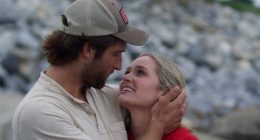
Lane Luper, the A-camera first assistant on Rust, resigned from the production along with six of his colleagues in the camera department over what he described as an unsafe work environment before Alec Baldwin fatally shot director of photography Halyna Hutchins during a rehearsal.
Luper, 33, spoke to The Hollywood Reporter about working conditions on the New Mexico set, the role that Baldwin and other producers played and why it’s “irresponsible” to imply that someone deliberately planted the live ammunition that killed Hutchins.
The Santa Fe Sheriff’s Office is still investigating the Oct. 21 shooting. In a statement, Rust‘s producers said, “Mr. Luper’s allegations around budget and safety are patently false, which is not surprising considering his job was to be a camera operator, and he had absolutely nothing to do with it or knowledge of safety protocols or budgets. As we continue to cooperate with all investigations, we are limited in what we can say. However safety is always the number one priority in our films.”
Tell me about what your experience was on the set prior to the day that you walked off.
It was a short shooting schedule, so it was a huge page count on the day. It was always rush, rush, rush, hurry, hurry, hurry. There was always an attitude of, “We don’t have enough time to do rehearsals. We don’t have enough time for safety meetings. We don’t have enough time to do a lineup.” Oftentimes, the only time we would get a rehearsal is because Halyna would actually fight with the first assistant director to get a rehearsal. And oftentimes, he would say as soon as she walked away, “You guys don’t need a rehearsal,” and would call rolling anyway.
We would line up shots that didn’t exist. We were guessing what the talent was going to do. I had one conversation with [first AD] Dave Halls, it was the seventh day he was shooting, about needing a rehearsal on the steadicam shot they were doing. [Editor’s note: Halls’ attorneys have not responded to multiple requests for comment from THR.] It was a one-take shot, and it was this beautiful thing that Halyna was setting up. This gorgeous shot that started on a second story of a saloon, and it came down the stairs, and we would wrap around. We’d introduced this character, and he would stand at a bar, and we were going to do it in one shot. But instead of rehearsing it, they packed the background [actors] into the saloon. … We got one take, and the boom got in the shot, and [director] Joel Souza scrapped the whole shot and broke it up into pieces. It was just always hurry, hurry, hurry, hurry, hurry. There was no time to stop and think about what we were doing.
How many pages were you shooting a day?
So it’s a Western. My normal experience with Westerns is we do two and a half to four pages a day. On this, our average page count was anywhere from five and a half to eight. So almost double and triple the work.
There are a lot of producers listed on the film. Who was actually the producer on the ground that was running things?
Ryan Winterstern and Nathan Klingher. They were micromanaging the heck out of the show. Ryan, very particularly, he would have these very energetic conversations, loud conversations, with the first AD.
Baldwin was also a producer on the film, in addition to being the star. Did he do many things as a producer? Was he mostly focused on acting when he was there?
Baldwin wasn’t even there the first week of the show. And when he was there, he was only there for four to five hours a day, doing his role as an actor. I never saw Baldwin in any kind of producer role.
So you guys are working fast and long days. What were the immediate events that led up to you deciding to walk off?
The negligent [gun] discharges on Oct. 16 was a big safety concern that I had brought up with the unit production manager, and it was immediately dismissed. We had a special effects explosion on the third day of filming that went off over the crew. There was really poor weapons handling skills. And yeah, the housing issue was an issue. I had an hour drive every day to [the set] and an hour drive from [the set], plus getting ready in the morning and trying to get to bed at night. I was running on five hours of sleep, six hours of sleep sometimes. I was tired, and it was a punishingly difficult show: eight pages where you have to hand carry a majority of the film equipment, these cameras are heavy; COVID was a huge issue, because they would pack the passenger vans completely full [and] people would have their masks down. And then my crew didn’t receive paychecks. They received a small advance that didn’t include their entire pay. And as a matter of fact, I actually just got a text message today that they’re still missing pay.
What’s the usual process for getting paid, and how was it different on this show?
The union contract stipulates that the week after the show, you have to be paid. And this one, they started by sandbagging people’s start work and not getting anybody any start work or then leaving paperwork out or then saying, “Oh, you need to fill out new start work in order to get paid. Sorry we lost this. Sorry we lost your time cards.” So it was a lot of silly excuses for a lot of what happened. And then when they did provide payment, they said that there was a glitch that nobody got paid for that, and “We’ll try and work it out.” And they came to set with personal checks that didn’t include taxes, union dues, FICA, Medicare. All of that was completely left out, and they were missing a prior week of pay already. Myself, I was missing all of my meal penalties and stuff like that. The checks were always short, and the checks were missing.
What was your experience of working with armorer Hannah Gutierrez Reed?
She just came across as incredibly overworked and inexperienced. She was on her second show. She had a department of three people on a show where everybody had a gun. It’s a Western. It’s a prop-heavy show, and the department was three inexperienced people. It’s fine on a Tier One [low-budget production] to have inexperienced people, but your department heads shouldn’t be, or people handling firearms shouldn’t be. It seemed like she was also under a lot of pressure to rush, rush, rush, rush, rush, rush, rush.
What was your reaction to her attorney implying on the Today show that someone on the set had potentially deliberately placed the live rounds?
The idea of it made me sick because film sets, everybody on a film set becomes pretty close with each other. I considered everybody on that show to be a friend, personally. I thought the fact that they were going on morning television and saying that was irresponsible, slanderous and quite frankly just disgusting. The whole idea of it was just gross.
What ultimately made you decide to leave the shoot?
They were calling a bunch of non-union kids and other folks to try and come in and replace us as early as day seven on the show. I get a phone call from a friend of mine who’s not in the union, he’s a camera operator. And he said, “Hey, I just got a call because they’re thinking you guys are going to go on strike and they want to replace you.” I was like, that’s very strange. Because no, we weren’t going to go on strike. And then we get text messages from other camera assistants who had said, “Hey, they’re looking to replace you guys.”
I approached Nathan Klingher on Sunday [Oct. 17]. I had a conversation with him trying to work stuff out and be like, “Hey, what’s going on? I’m hearing that you guys are trying to replace us.” And then I talked to him about rehearsals and needing to spend time knowing what’s going on, because that way, if the crew knows what’s going on, then we only have to do things once. And that could actually save you money because then we could work more informed and quickly and safely. And he said, “You’re right. I’m going to take care of you guys. And I’m going to talk to the rest of the producers and we’ll work this out.” And Nathan went back to Ryan and they formed their little circle with [producer] Anjul [Nigam] and everybody. I get a text message with a screenshot of an email. [Line producer] Gabrielle Pickle started reaching out to more camera assistants and said, “Hey, I’d like to get you on the phone…so we can start talking about your onboarding process.” At that point, I was like, “OK, so taking care of us just means you want to get rid of us.”
On Wednesday, the 20th, we had a brutal day. We were working in a ravine that was about 200 yards off of a dirt road. In between the dirt road and the ravine is nothing but sugar sand and shrubs and stuff like that. It was very difficult to work in. We had to hand carry all of the camera equipment from the camera truck down to the ravine and then down into the ravine, which is about 12 feet deep. Everything had to be carried into there. And so all of our scenes were in this incredibly difficult working environment. Everybody was exhausted by the end of the day. And Robert, the B camera second AC [assistant camera], he was exhausted and he asked production for a room that night and they just flatly responded with “I’m sorry, because you’re not working 13-plus hours or live 60 miles away, we won’t provide you with any hotel rooms.” And it became a straw that broke the camel’s back.
I had told Halyna earlier in the week that, “Look, I’m going to leave the show if these things happen.” And she was like, “OK. I understand.” And she actually fought for the crew. She gave up equipment to the producers. She kept trying to do everything she could to cut things back. And instead she was met with getting screamed at by Ryan Winterstern in the AD trailer on that Wednesday, when we tendered our resignation. They would say things to her like, “Oh, it’s taken care of. We’ll take care of the situation.” And then the next day [they would] go back on that.
When you came in on Thursday morning, the day Halyna got shot, you guys were coming to get your gear?
Yeah. We showed up 6:30 in the morning. We opened up the camera truck. All of us started pulling apart the things that we owned, the things that are our personal gear, started removing our equipment from the truck. We started organizing what belonged to the show, what belonged to us.
As we were packing our things, Gabrielle Pickle came to the camera truck. She came straight to me, said to vacate the premises immediately, otherwise she’ll call security. And I said, “As soon as we’re done, we’ll get out of your hair,” kind of thing. We got all of our equipment all wrapped up.
I had a conversation with Halyna in the camera truck, gave her a big hug. She said she felt like she was losing her best friends, and I started singing to her. We chatted for a little bit and then she left to go try and start lining up the rest of the day. We finished packing stuff up and we left right around 7:30. We went and got breakfast as a camera department over at The Pantry in Santa Fe, and then we all went our separate ways. I went home and I took a nap. I’m laying on my couch and all of a sudden my phone just started exploding. I actually rode my skateboard straight to the hospital. And then we heard that [Hutchins] had passed away.
Have you had any communications with the production since it shut down?
None at all. They had a memorial and stuff like that and they left us all out of it.
What’s the feeling among your colleagues who worked on this movie? How are people doing?
Everybody’s going in and out of these cycles of depression. Several of my friends don’t even want to go back to work. Everybody has a level of PTSD from this, especially people that were there. I have a problem right now that I’m trying to work through, which is how do I trust going onto a set and having somebody who’s an armorer who I don’t necessarily know? How do I trust them? How do I trust producers to not make T-shirts to make fun of me?
Tell me about the T-shirts. What was that exactly?
They made T-shirts to make fun of the camera department who were driving from Albuquerque — these T-shirts that the production office themselves ordered that say, “Rust crew, Error 404, Housing Not Found,” which is like an internet joke. Down the sleeve it says, “I’m sorry, Albuquerque is an hour away,” which is a straight dig at me because I had that conversation with Gabrielle Pickle. Yeah. It was tacky. T-shirts mocking people were more expensive than the safe, clean hotel room that I was asking for.
Well, thank you, Lane.
No, thank you. Halyna was something special, and anybody who knew her knew that. Her whole career was ready to be a rocket ship. Her work, it’s just plain good. It was kind of inspiring. She had this nerdy approach to everything, and she loved lenses and she loved all this creative stuff. When I met Halyna and [her husband] Matt and [son] Andros, their apartment had a ton of board games in it. It looked like they loved to play board games and that was just adorable. They were just an adorable family.
This interview has been edited for length and clarity.
Source: HollyWood









